Nicotine pouches are a major health hazard for dogs, because of their physiology. If your dog ate a nicotine pouch, the best course of action is to take him to a veterinarian. Home remedies and self-help are risky as an immediate solution, and are not worth it.
Nicotine is a poison for pets and can easily cause fatal consequences. Unfortunately, most people even fail to notice that their pet has ingested a nicotine pouch. We'll look at some tell-tale signs of nicotine ingestion in pets, the effects, and some possible immediate solutions.
What Happens When a Dog Eats a ZYN Pouch?
When a dog eats a nicotine pouch, his body is flooded with excess nicotine. Dogs have very low nicotine thresholds, and even small amounts of nicotine can cause an overdose. Within 2 to 10 minutes, their nerves become overstimulated, which causes a myriad of different side effects.
One of the most common symptoms of nicotine overdose in pets is diarrhea, drooling, and vomiting. Your cute canine companion will also have dilated pupils and tremors. Your pet might also feel more excited and restless.
The second stage of nicotine poisoning includes hallucinations, rapid breathing, tremors, and ataxia. If the dog ingested an excessive amount of nicotine above the lethal dose, it can also cause coma, seizures, cardiac arrest, and collapse.
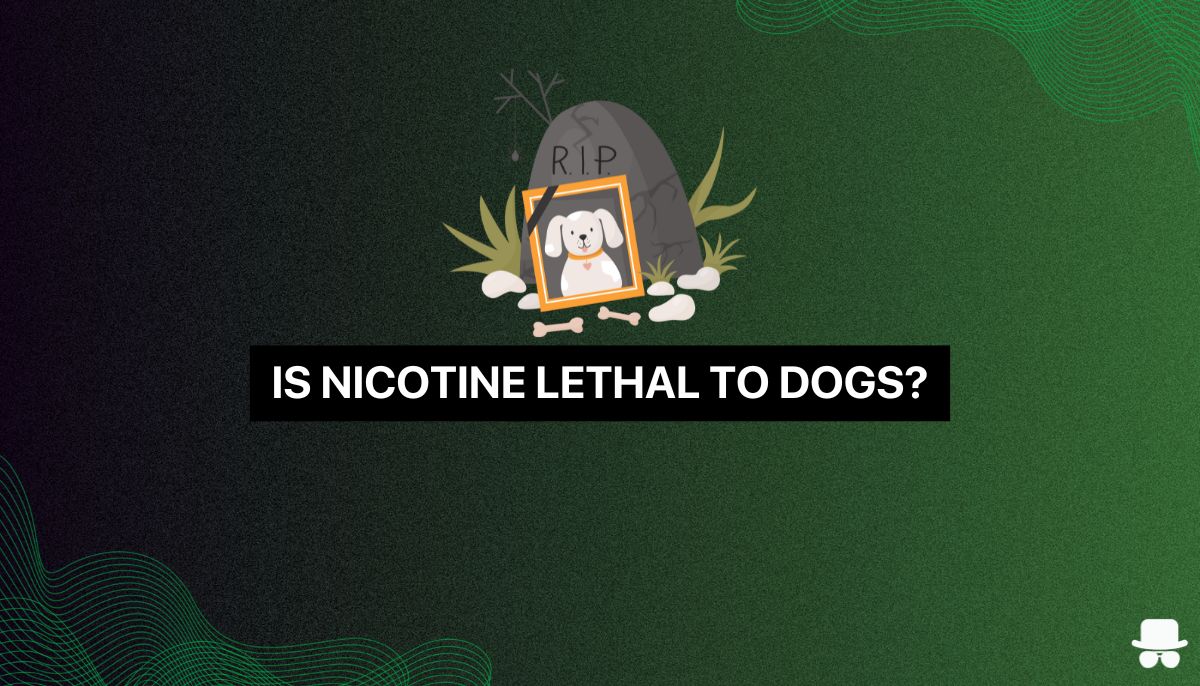
Is Nicotine Lethal to Dogs?
Yes, nicotine is lethal to dogs, because of their low nicotine toxicity tolerance. Dogs have low body weight compared to humans, which means they cannot tolerate even the lower mg of nicotine concentrations.
Nicotine ingested in large quantities by a dog may cause problems such as cardiac arrest, coma, or seizures. If left untreated, even the minor problems like diarrhea, drooling, and vomiting, can prove lethal for most pets.
Nicotine pouches also contain xylitol, acesulfame K, and sodium carbonate. Xylitol in particular can cause liver failure in dogs, which is very lethal.
What is the Lethal Dose of Nicotine for Dogs?
According to VetMed, 9 to 12 mg of nicotine per kg of body weight is lethal for most dogs. This threshold is even lower for small dogs, which means most nicotine pouches are unsuitable for pet dogs. Even one pouch can cause a nicotine overdose in dogs.
Toxic Nicotine Thresholds for Dogs
Most nicotine products are very dangerous for dogs. However, the strength of these effects can change based on the nicotine thresholds of various dogs. Here's a complete guide on nicotine toxicity levels for different dogs according to their body weight:
| Type of Dog | Size | Weight | Toxic Nicotone Level |
| Yorkie | Very Small | 0.45 to 4.6 kg | More than 4 mg |
| Chihuahua | Very Small | 0.45 to 4.6 kg | More than 4 mg |
| Boston Terrier | Small | 5 to 11.4 kg | More than 44 mg |
| Poodle | Small | 5 to 11.4 kg | More than 44 mg |
| Pug | Small | 5 to 11.4 kg | More than 44 mg |
| Corgi | Small | 5 to 11.4 kg | More than 44 mg |
| Scottish Terrier | Medium | 11.8 to 18.2 kg | More than 100 mg |
| Beagle | Medium | 11.8 to 18.2 kg | More than 100 mg |
| Dalmatian | Medium | 11.8 to 18.2 kg | More than 100 mg |
| Basenji | Medium | 11.8 to 18.2 kg | More than 100 mg |
| Boxer | Large | 18.6 to 31.8 kg | More than 160 mg |
| Cocker Spaniel | Large | 18.6 to 31.8 kg | More than 160 mg |
| Golden Retriever | Extra Large | 32.3 to 40.9 kg | More than 290 mg |
| German Shepherd | Extra Large | 32.3 to 40.9 kg | More than 290 mg |
| Great Dane | Giant | 41.4 to 50 kg | More than 370 mg |
| St. Bernard | Giant | 41.4 to 50 kg | More than 370 mg |
The toxic nicotine levels for different mix dog breeds can be slightly slower than the standard body weight. Mixed breeds have other deficiencies and countless health problems, which can lower their immunity and tolerance levels.
What Should You Do If Your Dog Swallowed a Nicotine Pouch?
The first thing that you should is to called a veterinary. Take your dog to the nearest veterinarian or call (855) 764-7661 for immediate guidance. You should do this no matter how much nicotine your dog has ingested.
The symptoms of nicotine poisoning are often related organophosphates, strychnine, and mycotoxins. The symptoms may also be similar to the symptoms of other diseases, which is why you'll need the help of a qualified veterinarian.
Some Solutions for When a Canine Eats a Nicotine Pouch
The only thing you can do is to identify the signs of nicotine poisoning. You can check your pet's surrounding and the immediate side effects to identify the cause of the problem. Identify these causes and convey them to the veterinarian.
Your vet will take the next possible steps, which will mostly likely include induced vomiting. It takes about 2 hours before the severe effects of nicotine poisoning takes place. The veterinarian may administer activated charcoal to bind the nicotine.
It will prevent the absorption of nicotine into the guts, livers, and other organs. The veterinarian may also administer IV fluids to rehydrate your canine. All of these steps and the diagnosis of nicotine poisoning can only be taken care of by the veterinarians.
Are There Any Home Remedies for Dogs that Have Swallowed ZYNs?
There are no home remedies that you can use to alleviate the symptoms of nicotine poisoning in dogs. There are countless home remedies out there, but these aren't effective. You shouldn't risk the health of your pup or canine.
However, you can use home remedies after the veterinarian has had a look at your pet. Great aftercare can significantly help the recovery process of your pet.
Are There Any Reported Cases of Dogs Eating Nicotine Pouches?
Yes, there are reported cases of dogs eating nicotine pouches. We snooped around different social media platforms to find some of these cases. One case that we found was on Reddit, from a deleted account in the subreddit r/puppy101.
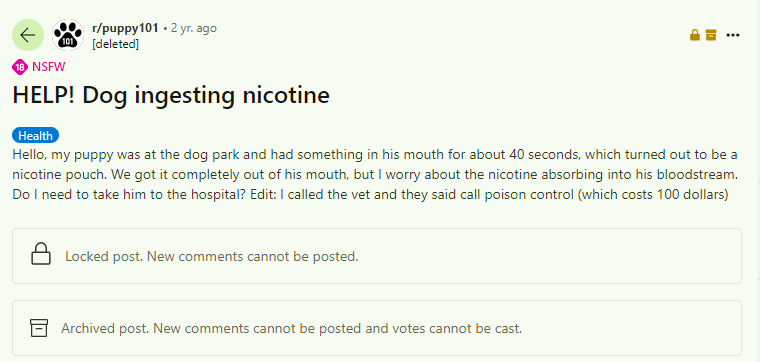
Fortunately, most of the members recommended taking the pet to a veterinarian.
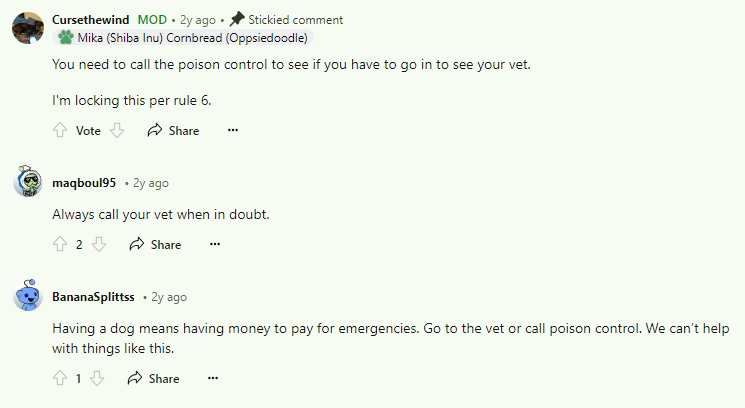
We don't know if the dog owner acquiesced to their recommendation or went against it. We found another case, which was from a deleted account in the subreddit titled r/VetHelp.
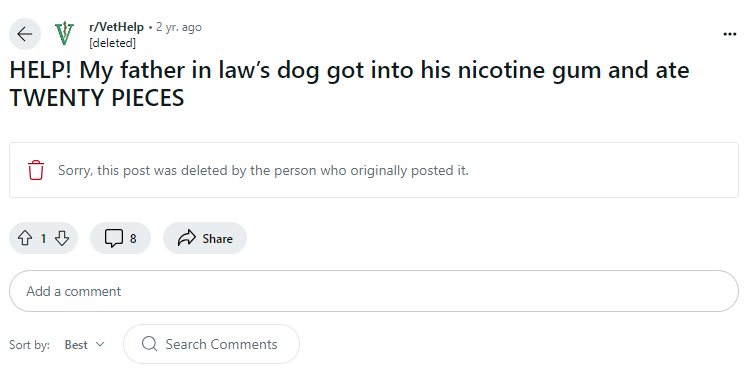
Most of the comments recommended taking the pet to a vet, because there is nothing that you can do at home.
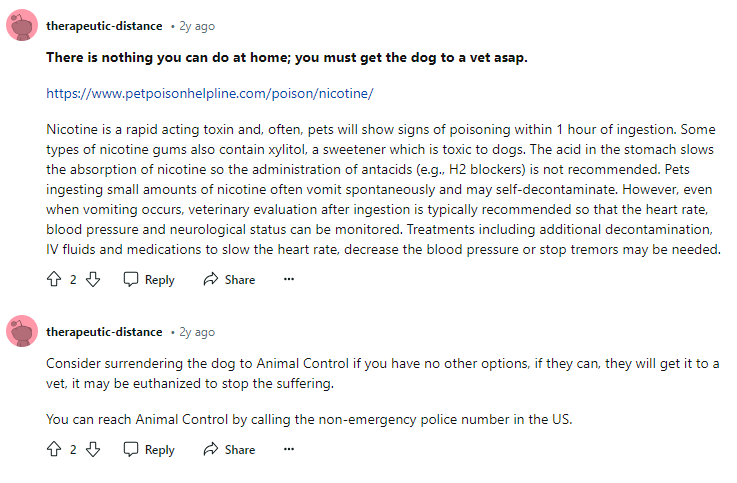
From of these accounts, the only thing that you can do is to take your pet to a vet. This applies to all pets, irrespective of the amount of nicotine ingested.
Can Used ZYN Pouches Cause Nicotine Poisoning?
Yes, used ZYN nicotine pouches can cause nicotine poisoning in dogs. Most nicotine pouches still contain about 40 to 50% of their initial nicotine concentration. If your dog ate a use ZYN pouch, it can still cause nicotine poisoning.
For example, a used 6 mg ZYN pouch could still have 2 to 3 mg of nicotine. This can cause most of the smaller side effects of nicotine pouches. It's why you need to dispose of used ZYN pouches and other nicotine products adequately.
Can Other Nicotine Products Cause Nicotine Poisoning in Dogs?
Yes, cigarette buds, snus, e-cigs, nicotine salts, and almost every other nicotine product can cause nicotine poisoning in dogs. Cigarette buds in particular are indigestible and can cause various problems, like upset stomach and vomiting.
E-cigs and snus also have high levels of nicotine, which can cause severe symptoms of nicotine poisoning. Nicotine gum in particular can cause very severe symptoms because they contain high amounts of nicotine and xylitol.
How to Prevent Nicotine Poisoning in Dogs?
The easiest way to prevent nicotine poisoning in dogs is to keep nicotine products away from pets. Always keep your nicotine or tobacco pouches in a drawer away from the floor. You should also throw your pouches away in a trash bin.
Never leave used pouches on the floor or in open boxes. Dogs love the smell of used tobacco pouches. The moment they smell a use nicotine pouch, they go "Oh Yum Yum." Keeping these pouches away from them is the best step to prevent nicotine poisoning.
Conclusion: Take the Pup to a VET!
If your dog ate one nicotine pouch or more, take your dog to a vet. Nicotine is very toxic to dogs, which can cause countless problems like diarrhea, vomiting, and more. Some stronger symptoms include coma, cardiac arrest, and seizures.
You can not take care of most of these problems. The only step that you can take is to take your dog to a veterinarian. Only a qualified vet can take care of these symptoms and take the necessary steps to keep your pet safe.




